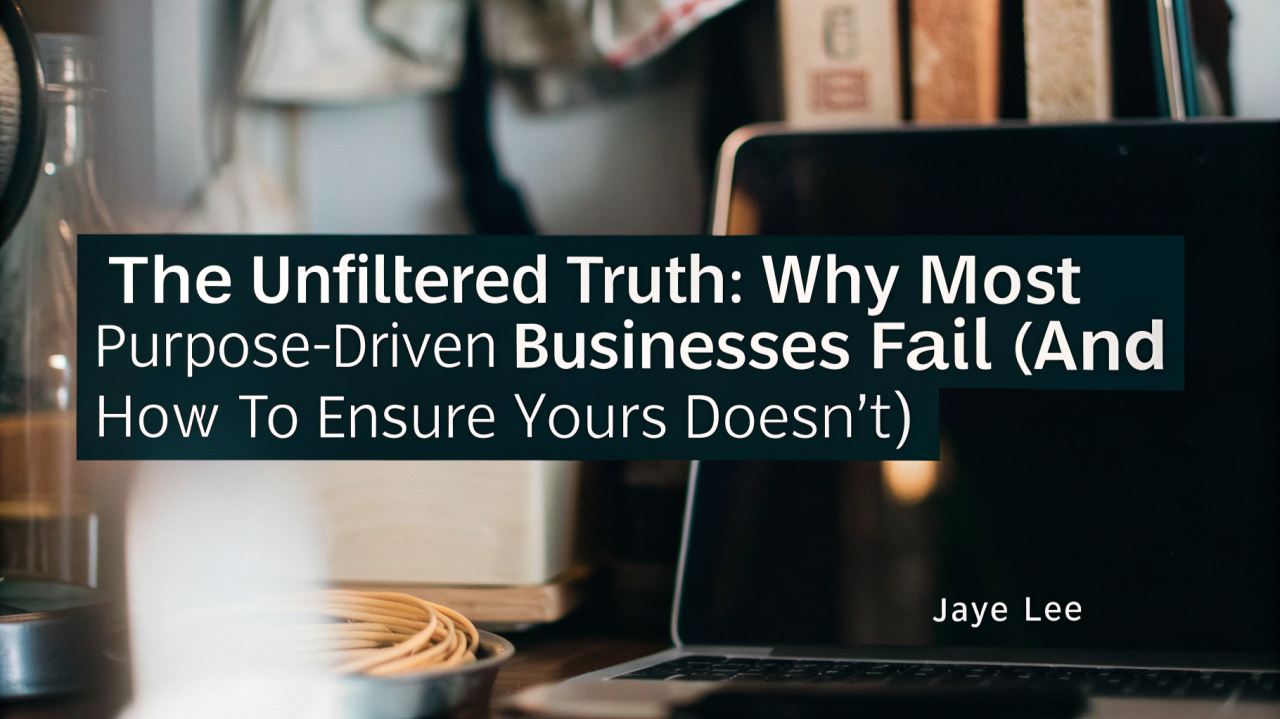
Why Most 'Purpose-Driven' Businesses Fail (And How to Ensure Yours Doesn't)

Jaye Lee
Business Strategist for Therapists & Coaches | ICF PCC | Scaled 3 Startups | Certified Mentor Coach & Supervisor | CEO Whisperer for the Helping Professions
When a client recently told me they wanted to build a “purpose-driven business,” I had to stop myself from rolling my eyes on the side. Not because the purpose isn’t valuable. It absolutely is! But because the term has been so overused that it’s lost almost all meaning.
While purpose can drive long-term resilience, businesses must balance purpose with financial discipline to avoid common pitfalls like overestimating demand or underestimating resource needs.
Businesses that lead with “purpose” as their primary selling point fail within the first three years. Why? Because purpose without profit is just an expensive hobby.
The Dangerous Romanticism of Purpose
We’ve been fed a steady diet of inspirational quotes telling us to “follow our passion” and “find our purpose.” It’s the entrepreneurial equivalent of “live, laugh, love” looks great on Instagram, but pays exactly zero bills.
The truth is harsh but necessary: The market doesn’t care about your purpose. It cares about the value you create. Full stop.
The Entrepreneur emphasize that purpose-driven businesses must integrate pragmatic strategies to succeed. While purpose alone isn’t sufficient, combining it with financial discipline and market awareness creates sustainable value
The Three Delusions of Purpose-Driven Failure
After coaching hundreds of helping professionals to build sustainable businesses, I’ve identified three critical delusions that sink most purpose-driven ventures:
Delusion #1: “If I care enough, customers will come.” Reality check: Caring is table stakes. Your ideal clients assume you care. What they’re really asking is, “Can you solve my problem better than anyone else?”
Delusion #2: “My purpose makes me unique.” Uncomfortable truth: There are thousands of coaches, consultants, and service providers who share your exact same purpose. Your methodology, results, and ability to articulate value are what make you unique.
Delusion #3: “Business strategy compromises my integrity.” This might be the most dangerous belief of all. Strategy isn’t the enemy of authenticity, it’s the amplifier. Without strategic thinking, your impact remains small, regardless of your intentions.
The Oneness Approach: Purpose WITH Profit
At Oneness, we’ve pioneered what I call “Strategic Authenticity”, the deliberate fusion of purpose-driven values with razor-sharp business acumen. Here’s what this looks like in my practice:
1. Brutal Honesty About Market Position: Before you can change the world, you need to understand exactly where you fit in it. This means conducting honest competitive analysis and finding the intersection between what you love, what you’re exceptional at, and what people will actually pay premium prices for.
A recent client discovered that her “holistic wellness coaching” was actually indistinguishable from 12,000 other coaches with the same title. After repositioning as a “Burnout Recovery Strategist for High-Performing Women in Tech,” her business grew 287% in four months.
2. Engineered Value Perception: The harsh reality is that perceived value drives pricing power more than actual value. This isn’t manipulation, it’s communication clarity.
I recently worked with a therapist whose sessions created life-changing breakthroughs. Yet she struggled to fill her practice, charging SGD$ 120/ hour. Why? Because she presented her services as “therapy sessions” instead of “Cognitive Resilience Programming.” After reframing her offering (and doubling her rates), she now has a 4-month waiting list.
3. Community as Strategic Asset: True community building isn’t just about creating warm, fuzzy feelings. It’s about strategically designing spaces where value exchange happens organically, reducing your customer acquisition costs and increasing lifetime client value.
The data backs this up. HBR highlights that customer retention drives profitability, while community-building strategies enhance loyalty. Effective community engagement often reduces marketing costs by leveraging peer advocacy
The Unromantic Truth About Purpose
Here’s the insight that transformed my own business and those of my clients:
Purpose isn’t your business’s foundation. It’s the roof.
Strategy, systems, and market positioning form the foundation. Your operational excellence builds the walls. Only then can purpose form a roof that gives meaning and protection to everything underneath.
Without this structure, purpose becomes a weight that eventually crushes your enterprise, not the lifter that elevates it.
An Invitation to Strategic Authenticity
If you’re a helping professional trying to reconcile your desire to make a difference with the necessity of building a profitable business, consider this your wake-up call.
Your purpose deserves better than to be poorly packaged, underpriced, and eventually abandoned when financial reality hits. The world needs your gifts, but it needs them delivered through a vehicle strong enough to go the distance.
At Oneness, we’re building a community of professionals who refuse to choose between making an impact and making a profit. We reject the false dichotomy that says you must compromise your values to succeed in business. Instead, we embrace the more challenging but infinitely more rewarding path of strategic authenticity.
As I tell my clients, “Your purpose isn’t your business plan. But your business plan is what ensures your purpose survives.”
Are you ready to bring strategic clarity to your purpose-driven business? Let’s connect. Because the world doesn’t need more well-intentioned business failures. It needs purpose-driven leaders who are equally driven by results.
What’s your experience with balancing purpose and profit? Share your thoughts in the comments below. I promise to respond with the same unfiltered honesty you’ve come to expect from me.
About the Author: Jaye Lee is a Business Strategist and Mentor to Entrepreneurs in the Helping Profession. Based in Singapore, she supports therapists, coaches, and wellness professionals in scaling their impact and building sustainable businesses. Her work focuses on translating clinical expertise into entrepreneurial success, leveraging over a decade of experience in coaching, startup development, and strategic growth.
#PurposeDrivenProfit #BusinessStrategy #EntrepreneurialMindset
Reference:
Entrepreneur: https://www.entrepreneur.com/growing-a-business/how-to-balance-profit-and-purpose-in-your-business/463792
HBR: https://hbr.org/2014/10/the-value-of-keeping-the-right-customers

0 Comments